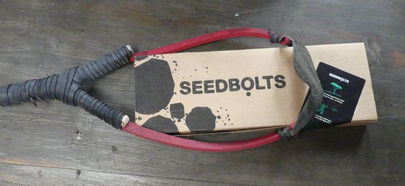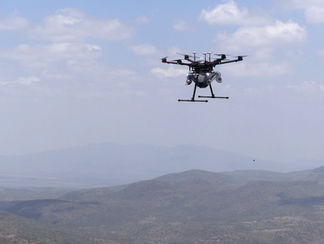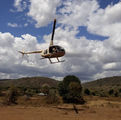




60,500,000 SEEDBALLS DISTRIBUTED SINCE SEP. 2016
join our campaign
let's re-green kenya!
Forests are among the world’s most productive land-based ecosystems and are essential to life on earth.
Every year, seven million hectares of natural forests worldwide are converted to other land uses such as large-scale commercial agriculture and other economic activities. Kenya has only 7.4% forest cover, well under the minimum 10% suggested by the United Nations.
Join our campaign to re-green Kenya whilst helping to off-set your carbon footprint.




Photo courtesy of Kelvin Kamachu
Photo courtesy of David Sheldrick Wildlife Trust

Seed-balling,
Seed bombing, or in some cases aerial reforestation, is a technique of introducing vegetation to land by throwing or dropping seedballs. Often done with arid or off-limits land (for example privately owned).
The process is usually done as a large-scale project with hundreds dropped in a single area at any one time. Provided enough water, adequate sunlight, and low competition from existing flora and fauna, seed-balled barren land could be host to new plants in as little as a month.
Seedballs have use in nearly any region where plants can grow: for reseeding ecosystems into areas of man-made deserts, avoiding seed eating insects and animals and protecting seeds until rains fall to soak the clay ball and stimulate the seeds. Seeds contained in such balls then germinate in ideal conditions for each climate/region.
It's simple,
JUST THROW AND GROW!



'ACACIA,
the roots of Kenya
Behind the seeds'
Watch the documentary by OCB,
featuring Seedballs Kenya and Teddy.
Sit back, see the work we do and take in the spectacular scenery of magical Kenya.

Director's Cut 10'
Extended Version 20'





LARGE SCALE SEEDBALL PROJECTS
& VIDEOS
Communities & Education

Soil erosion caused by land degradation is one of the most serious challenges in the dry ecosystems of Kenya. Protecting and growing more indigenous grasses and trees is one great way to start repairing damaged landscapes like these that are becoming an increasingly common sight.
We would like to thank everyone who is making a real difference. By distributing Seedballs you are truly helping to re-green Kenya. The efforts you are making now will be long lasting. Thank you again.








Zetech University Donation
Follow Up Photos
An update from one of the Seedballs donations Grand Africa Safaris donated last year.
On 25th September 2025, we did a follow-up visit at Zetech University, where part of Grand Africa Safaris donation was planted in 2024.
The results were amazing and many of the trees have now grown into big, thriving trees, creating shade, improving the landscape and showing a real, long-term impact.
More follow up photos to come from their other donations.
zetech university


Neutralising the carbon footprint of Bolt rides and Bolt Food deliveries



Why Seedbolts?
Planting Seedbolts is:
-
Efficient: Seedbolts can be distributed at any time of the year and will wait until the first rains to start germinating.
-
Accessible: Large quantities of Seedbolts can be easily dispersed over wide areas that are often hard to reach.
-
Productive: Direct seeding reduces transplant shock and helps young trees grow stronger roots which, in turn, helps them grow into stronger trees. The coating protects the seed until the first rainfall and then provides a favourable environment to encourage germination.
-
Local: The Seeds are sourced from the Kenya Forestry Research Institute who keeps a stock of seed of about 220 tree species collected from more than 600 provinces across Kenya.
-
Precise: Researchers from Seedballs Kenya define what kinds of trees grow best in each area and manufacture Seedbolts designed for that area.
-
Traceable: You can see where Seedbolts were planted by checking the map. The map has photos and GPS points of the locations where the partners spread them.
How will Bolt plant over 11 million Seedbolts?
Throughout this year, we’ll be distributing tree and grass seeds by road and air, with the support of various NGOs.
Specifically:
-
South Eastern Kitui University;
-
Kibwezi Well Wishers;
-
Save The Giraffes Now;
-
Kijabe Forest Trust;
-
Sheldrick Wildlife Trust;
-
Kampour Travel Foundation;
-
Mother Earth Network;
-
Eden Project;
-
and the Big Life Foundation.
-
By initiating the Seedbolts project and planting over 11 million new tree seeds across Kenya, we’re effectively watering two plants with one hose. We’re growing new trees to neutralise carbon emissions from our services as well as stopping erosion, water runoff and improving land fertility in the country.

TOTAL SEEDBOLTS FOR KENYA NOW REACHES 14 MILLION!
SCROLL THROUGH THE bolt PHOTO GALLERY

Neutralising the carbon footprint of Bolt rides and Bolt Food deliveries

Thank you very much @officialkenyaairways Fahari Aviation Wing for inviting us for this seeding demo at #Kaptagat Forest.
Incredible stuff!
And thanks to @bolt
for supporting this big day with the Seedballs




1. Scroll in
2. Drag map
3. Click on pin to see data
TO SEE
CURRENT
SEEDBOLTS
SITE DATA

The World Vision Kenya stand at the Africa Climate Summit 23 in Nairobi. See the display of the amazing new #seedball dropping drone built by @kenyaflyinglabs

Sri Lanka high commission, kenya
Thank you very much Sri Lankan High Commission Kenya, Ambassador Mr. Kanna for your amazing dedication to #GreeningKenya with your huge contribution of 1 million indigenous tree seedballs that will be sent to City Hall for distribution all over Nairobi and it's environs.

1 Million Seedballs being loaded
KONA BARIDI, NAIROBI
Thanks KEFRI, Ministry of Environment & Forestry, Kenya Flying Labs and Astral Aviation for hosting this excellent drone seeding public demo at Kona Baridi





Subukia, nakuru county
one million seedballs in 2 hours
MOTHER EARTH NETWORK & Father Hermann Borg
1 Million Seedballs were distributed in 2 hours on
25th February 2022 from 11:00 am to 1:00 pm








Thanks to Farmland Aviation for donating the use of their fabulous 'Air Tractor' crop-duster to spread seedballs over the higher, further and more difficult parts of the Subukia Valley and surrounding hills.
Some of the 1,200kgs of indigenous tree seedballs that were distributed among 22 schools in the eastern side of the Lower Subukia Valley. These were planted on farm and around the schools focusing on the tree types that used to be prevalent there in the past before charcoal making took its toll.
Thanks to these seven wonderful secondary schools for taking part-
St. Michael Gatagati ,St. Ulrich Lama, Olmanyatta, Simboiyon, Wiyumiririe, Umoja, St. Francis.
masai mara
one million seedballs in a day


An ambitious planting initiative was proposed by Mara Elephant Project partner, Seedballs Kenya, to distribute over one million seed balls in the Mara in one day!
The proposal was generously funded by Diamond Trust Bank and MEP was asked to join as one of the key stakeholders of wildlife conservation in the greater Mara ecosystem and beyond.
LOLDAIGA HILLS, LAIKIPIA








Equity Bank Kenya, British Army Training Unit, Kenya (BATUK), Tropic Air Kenya, Kenya Wildlife Service (KWS), Kenya Forestry Service (KFS), National Environment Management Authority of Kenya (NEMA), the Laikipia County Government and the many other green partners who came together to help aerial seed some of the lost olea africana forests in the beautiful Loldaiga hills, Laikipia. Over 100,000 Seedballs were distributed by helicopter.







narok
5th August 2018 -
Kenya's first ever large scale trials of aerial tree seeding.





A huge round of thanks to Narok County Senator Ledama Olekina #33Senate, Farmland Aviation Ltd, Kenya Forest Research Institute and Kenya Forest Service for conducting this first ever large scale test (appx. 5,000 acres in S.E Mau) of aerial tree seeding in Kenya using both bare seed and our seedballs!
Onwards and upwards to growing more indigenous trees in Kenya. We will need thousands of kilos of high quality tree seeds in the coming years to reach the National goal of 10% forest cover by 2022, if you are interested in being trained in collecting or growing trees for seed (indigenous species only please) contact us today to apply.
CHYULU HILLS
David Sheldrick Wildlife Trust



In October 2018, the DSWT launched a new project aimed at inspiring school children to start planting trees. The two-pronged approach involved a large-scale seed-balling initiative in Chyulu Hills National Park (CHNP) and a tree planting competition involving 731 school children from 4 different schools also bordering CHNP.
Just a few weeks prior, a large wild fire caught on the edges of Kikunduku Primary School. Fortunately, the school was spared, however, a large area of the bordering Park was burnt. This presented us with the perfect opportunity to involve the students in a reseeding effort to help speedup the reforestation process and educate them on the importance of forests and their protection.

On 25th October 2018, with approximately 450,000 seed balls purchased from Seedballs Kenya, over 300 students participated in the largest seed-balling effort in Kenya to date. The seed balls, coated in a thick layer of protective char dust, consisted of a mix of 4 different locally indigenous acacia species. This coating helps protect the seeds from predation and provides a small amount of nutrients to give the seeds within a ‘jump-start’ as soon as adequate rainfall triggers the germination process. Not all of the seeds will become trees, but even if only 5% survive, this will equate to over 20,000 trees, planted in the space of one hour. And 10 years from now, the students will be able to gaze across the fence from their old school and point proudly at the forest they created.
Photos courtesy of David Sheldrick Wildlife Trust

Seedballs being distributed by David Sheldrick Wildlife Trust, piggy-backing on existing patrols.

Teddy trucking with 440,000 Seedballs from the Chardust factory to the Chyulus and surrounding areas for distribution by the David Sheldrick Wildlife Trust.
MACHAKOS
Assisted FMNR demonstration site in Matuu, Machakos County
with Seedballs Kenya
Nov 2017 - Nov 2018

September 2018 - the lower branches of the sesbania have been pruned for fodder and the community has begun harvesting grass and sesbania seeds to sell to the neighbors.


REHABILITATION OF DENUDED LAND MADE POSSIBLE: NDIVUNI, MACHAKOS COUNTY
World Vision Kenya & WASHalliance
TAITA
Together with the Rotary Club Of Voi doing some erosion control work and trying out an innovative method of reseeding in the Taita Hills with indigenous tree seedballs donated to them by some wonderful people from Istanbul. Working with local communities in Taita to regenerate badly degraded areas, stopping gully erosion and growing trees at the same time. Piercing bags and inserting Seedballs into each hole.


KAJIADO
We successfully dropped 50,000 acacia seedballs on a ranch where alot of charcoal making had been happening near Mile 46 in Central Kajiado in just 20mins!
KIJABE HILLS
The Eden Forest Project distributing seedballs over damaged terrain on the Kijabe Hills.


Seedballs Kenya
throw & grow campaign videos
Seedballs Kenya Videos
Seedballs Kenya Videos


Cottar's Safaris, Masai Mara, Seedballs Kenya

Slingshot Drive By

Catapult































































